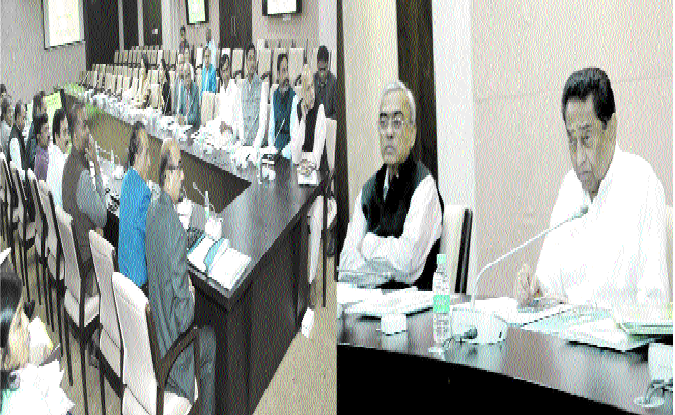Agriculture Advisory Council should become a result-oriented orgn: CM
| Date :08-Feb-2020 |

Chief Minister Kamal Nath said that the Agriculture Advisory Council should prove itself a result-oriented organisation in increasing farmers’ income, enhancing their purchasing power and strengthening agriculture sector. He further mentioned that he aims to make Madhya Pradesh, a Capital of Horticulture. This will strengthen economic condition of the farmers and economy of the state. Kamal Nath was addressing the first meeting of the council at Mantralaya after its formation. The Chief Minister said that mere discussions should not take place in the meeting. Draw conclusions and implement them in the betterment of the farmers. There is a need to work with this aim. Kamal Nath told members of the council to give suggestions to him and the secretary advisor before the next meeting, so that they could be studied and decision could be taken in the next meeting after the discussion.
Seed-free guava presented: In the meeting, the member of the council and progressive farmer of Ratlam, Tarachand Patel presented a seed-free guava to the Chief Minister. He informed that this produce, which is also exported. Kamal Nath said that State has agriculture based economy. Seventy percent of population is connected to the farming. Unless the farmers have purchasing power, we will not be able to expand the economic activities. For promotion of small trade and business, farmers need to be financially strengthened. Laying stress on the promotion of horticulture sector, he said that it is important that farmers have confidence that the crop produced by them will be procured.
He said that this is an area through which we can increase farmers’ income. The Chief Minister further informed that he is also constantly holding discussions with the big industries of the country in this regard. If food processing units are expanded in the state, our state will definitely establish itself as a leading state in the field of horticulture.
The Chief Minister hoped that on the basis of feedback received from farmers, Agriculture Advisory Council will play a role of co-ordinator between their needs and mechanism. Kamal Nath said that the excess production is the biggest challenge before us today, after less production. There is also a need to take practical measures with utmost seriousness on how to make excess production profitable for the farmers. He said that all the members of the Council should identify the present and future challenges in the agriculture sector and prepare a strategy, for making farming a profitable sector. He said that it is his intention that the Council should become an accountable platform. Formation and goals of council appreciated: Appreciating the formation of the council and its goals, the non-government members expressed gratitude towards the Chief Minister. The farmers leader, Shivkumar Sharma ‘Kakka Ji’ described the logic of making Madhya Pradesh a Horticulture state, a good idea. He mentioned that this is an only option of the prosperity of farmers. He thanked Chief Minister for disposal of 2 lakh cases of Namankan, Seemankan, Namantaran (Nomination, Mutation, Demarcation) etc. within only few months. He hoped that action will also be taken with promptness in remaining cases. The Farmer Leaders Dinesh Gurjar, Kedar Sirohi, Umrao Singh Gurjar, Brijbihari Patel and Vishwanath Okte also expressed their views. The Director Farmers Welfare and Agriculture Development Sanjeev Singh briefed on the objectives and goals of the council. Chief Secretary S R Mohanty, Additional Chief Secretary & Agriculture Production Commissioner Prabhanshu Kamal, Additional Chief Secretary Panchayat and Rural Development Manoj Shrivastava, Additional Chief Secretary Horticulture and Farm Forestry Iqbal Singh Bains, Principal Secretary Farmers Welfare and Agriculture Development & member Secretary i Ajeet Kesri, Vice Chancellor of Rajmata Vijayaraje Scindia University S R Rao, concerned officers and
members were present in the meeting.